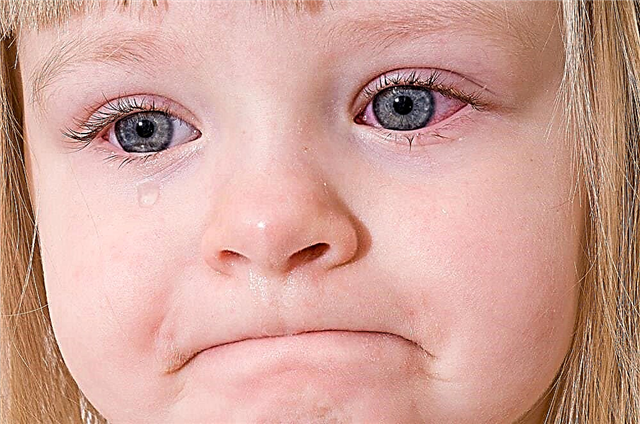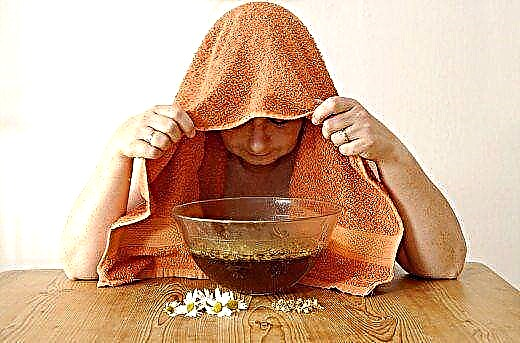
Attention! Erespal (for cough) has been withdrawn from circulation throughout the country. It turned out to be dangerous for children.
To combat cough, various medications are used that help eliminate such an uncomfortable symptom and other manifestations of diseases of the respiratory system. One of the popular remedies, which is often prescribed for adults with both dry and wet coughs, is Erespal.
It comes in two forms, but for children this medicine is prescribed only in syrup. If Erespal is prescribed for a baby, parents should learn more about its mechanism of action, possible side effects and dosages allowed in childhood. It is also worth asking what analogs, if necessary, can be replaced in order to obtain the same therapeutic effect.

Release form
Erespal in syrup is a product of the French company Les Laboratoires Servier, but can be produced both in France and the Russian company Pharmstandard-Leksredstva. It is sold in plastic bottles, which sometimes come with a 15 ml measuring plastic cup. The volume of syrup in one bottle is 150 ml or 250 ml.
The drug is a clear liquid with a yellowish brown tint. During storage, a precipitate is often formed in the syrup, but after shaking it often dissolves and the medication becomes transparent again. This medicine tastes sweet and smells good of honey and vanilla.


Composition
The main ingredient in Erespal is called fenspiride and is present in the syrup as the hydrochloride salt. Its amount in 100 ml of the drug is 200 mg, that is, from each milliliter of medication, the patient receives fenspiride at a dose of 2 mg. One of the auxiliary substances of the syrup is an extract from licorice roots, the dosage of which is also 200 mg / 100 ml.
To prevent the medicine from spoiling and remaining liquid, it included potassium sorbate, purified water and glycerol, as well as methyl and propyl parahydroxybenzoate. For sweetness, sucrose and saccharin are added to Erespal, and for the scent, the medicine contains vanilla tincture and honey flavoring. Such components include honey, natural flavors and ethanol in small amounts - less than 0.29 mg per 100 ml of syrup.
Operating principle
Erespal has anti-inflammatory effect, as well as the ability to prevent the development of bronchospasm. The syrup also has an anti-exudative effect and is able to relax smooth muscles. Its main component acts as an antagonist of substances that are released during an allergic and inflammatory reaction. First of all, we are talking about histamine, because Erespal blocks H1-receptors, but, in addition, the medication affects the production of serotonin and bradykinin. If the syrup is used in high doses, it can reduce the synthesis of other inflammatory mediators, as well as the formation of free radicals.

After entering the gastrointestinal tract, the drug is sufficiently well absorbed, and the maximum concentration of fenspiride in the blood is determined on average after 2-2.5 hours. Half of the absorbed drug is excreted within 12 hours. This occurs mainly in urine - only 10% of the active substance enters the feces.
Indications
"Erespal" is in demand for various diseases of the respiratory system and is used for hoarseness, runny nose, barking cough, sore throat, wet cough and other respiratory symptoms. This syrup is prescribed:
- with rhinopharyngitis;
- with bronchitis, including obstructive;
- with laryngitis;
- with bronchial asthma;
- with laryngotracheitis;
- with flu or SARS;
- with stenosis of the larynx;
- with tracheitis;
- with adenoids;
- with otitis media;
- with sinusitis;
- with angina;
- with whooping cough;
- with measles.

With all these diseases affecting the respiratory tract, "Erespal" has a pathogenetic effect, that is, it affects the processes that take place in the body of a sick person due to the influence of harmful bacteria, allergens, viral particles and other reasons. Thanks to the intake of syrup, a complex multidirectional effect on the respiratory tract is carried out:
- the activity of inflammation decreases;
- edema of the mucous membrane decreases or its occurrence is prevented if the disease has just begun;
- eliminated or prevented bronchial spasm;
- the viscosity of the mucous bronchial secretion decreases.
Such effects of the drug lead to an alleviation of the condition of a sick child, restoration of breathing and a reduction in the duration of the disease.


At what age is it prescribed?
As you can read in the instructions attached to the bottle, "Erespal" in the form of syrup can be used in children over 2 years old. If a child falls ill in the first years of life, such a medication is not prescribed for him, but an analogue that is allowed for such small patients is selected.
For schoolchildren and adolescents, Erespal is also given only in syrup. Due to the high dosage, the tablet preparation is not used in patients under 18 years of age.
Contraindications
Syrup is not prescribed not only to children under two years old, but also to patients with intolerance to fenspiride or any auxiliary component of the drug. Since there is sucrose in the liquid form of "Erespal", children with diabetes mellitus, lack of enzymes involved in carbohydrate metabolism, fructose intolerance or glucose-galactose malabsorption are given such medication with caution.

Side effects
During treatment with "Erespal" may appear:
- nausea, diarrhea, or other gastrointestinal disorder;
- tachycardia and low blood pressure;
- drowsiness, fatigue and dizziness;
- redness of the skin, rash, swelling, itching and other types of allergic reactions.
If the child has one or more of these symptoms, it is recommended to see a doctor. It is especially important to immediately cancel Erespal and show the patient to the doctor if you are allergic to the syrup.
Instructions for use
"Erespal" is first shaken and then poured into a measuring cup, a regular teaspoon (it holds 5 ml of the drug, that is, 10 mg of fenspiride) or a tablespoon (in such a measure there will be 15 ml of the drug, which corresponds to 30 mg of the active ingredient).
It is recommended to take the medication not after meals, but before meals. If a child is worried about a night cough, then the last dose of "Erespal" is best done at night.
The dosage for small patients should be calculated for each child separately according to his body weight. To do this, the baby's weight in kilograms is multiplied by 4 mg, for example, if the child weighs 15 kg, you get 15x4 = 60 mg. This is the daily dose of fenspiride for a given patient, which corresponds to 30 ml of syrup. It is divided into 2-4 doses, that is, the child from our example can be given the medicine twice 15 ml (one tablespoon or a full measuring cup), three times 10 ml or four times 7.5 ml per dose.
The average single dosage for patients weighing less than 10 kg is one teaspoon (5 ml), and for children who weigh more, one tablespoon (15 ml) is needed at a time. Depending on the disease, "Erespal" is taken in such doses from two to four times a day. For the smallest patients, syrup is allowed to be added to food. For adolescents, medication is given at 45-90 ml per day, dosing it with tablespoons.
The duration of taking "Erespal" is different for each child, because the list of diseases for which the syrup is prescribed is quite extensive. The course of treatment for acute respiratory viral infections will be short, and with inflammation of the bronchi or other serious lesions of the respiratory tract, it is necessary to give the medication much longer. Reapplication some time after the completion of the previous course should also be agreed with the attending physician.

Is inhalation prescribed?
Many medicines, usually taken by mouth, can also be administered by inhalation, which is done using a special device (called a nebulizer). Such procedures have a local effect on the airways, help eliminate smooth muscle spasms and moisturize the mucous membranes. The nebulizer helps to make a cloud of the smallest drops from a liquid medicine, which, when inhaled, depending on their size, fall into the upper or lower part of the respiratory tract.
Usually, inhalations are prescribed with solutions or drops, less often - with suspensions. But syrups are not suitable for inhalation treatment, therefore, manipulations with liquid "Erespal" are prohibited. The sweet drug cannot be sprayed to small particles that will affect the bronchial tree, and the risk of nebulizer breakage when trying to inhale the syrup increases significantly. So it is impossible to pour "Erespal" into the device chamber.
Overdose
If you give the child too much syrup, it can cause drowsiness (or, conversely, nervous excitement), bouts of vomiting or severe nausea, as well as an increase in heart rate. In such a situation, you should seek medical help so that the little patient has a gastric lavage, an EKG done and his vital signs are monitored.

Interaction with other drugs
If the child is already taking any medications, then before starting treatment with "Erespal" it is necessary to inform the doctor about it. The syrup is not prescribed simultaneously with any sedative drugs, as it can increase their depressing effect on the central nervous system. The manufacturer does not mention incompatibility with other drugs. Erespal is often prescribed together with antibiotics, mucolytics, and various symptomatic medications.
Terms of sale
To buy "Erespal" in a pharmacy, you need to present a prescription from a doctor, so examination by a pediatrician or other specialist is required. The average price of a bottle with 150 ml of syrup is 260-280 rubles. For a larger package - a bottle with 250 ml of medicine - you need to pay from 430 to 500 rubles.
Storage conditions
Keeping the syrup at home is permissible at room temperature, that is, storage in a refrigerator is not required. However, the drug must be placed in a place where the medication will not be available to small children, because because of the sweet taste, the child may accidentally drink it and get an overdose.

The shelf life of liquid "Erespal" is 3 years. If the date (month and year) indicated on the bottle has passed, the child cannot be given the medication.
Reviews
About 70-75% of reviews about Erespal are positive. In them, the parents confirm the good effect of the syrup and say that it helped with a prolonged debilitating cough or runny nose, and also eliminated discomfort in the throat. Most children enjoy the taste of the medicine, and the liquid preparation is easy to dose. The advantages of the drug also include convenient packaging, which lasts for a long time, and an affordable price. However, there are also reviews with complaints about the lack of a therapeutic effect. In addition, many mothers do not like the large number of chemical additives in the syrup, in particular, the presence of parabens in the composition. In some reviews, the taste of "Erespal" in syrup is called too sweet, and the price is too high.
The doctors' opinions about Erespal are also mostly good. Many ENT doctors and pediatricians prescribe such a remedy for various lesions of the respiratory tract - from acute respiratory viral infections to severe obstructions. They confirm the effectiveness of such a syrup, but emphasize that any medication should be given for coughs, sore throats, runny nose and other symptoms after a specialist examination.

Analogs
If it becomes necessary to replace Erespal with a similar medicine, the doctor will recommend an analogue with the same active compound, for example:
- Eladon;
- Erispirus;
- Epistat;
- "Sirep".
All these drugs are also produced in a syrup containing fenspiride at a dosage of 2 mg / ml, so they are a full replacement for Erespal, they are used for the same indications and in the same doses, and are slightly cheaper.
If you need to give the child, instead of "Erespal" medicine with another active ingredient, the doctor may prescribe medicines that have a similar therapeutic effect, for example, the following.
- "Singular". The montelukast present in this medicine affects the leukotriene receptors, thereby reducing the inflammatory and allergic reaction. The drug is most in demand for asthma and allergic rhinitis. In the form of 4 mg chewable tablets, it is prescribed for children over 2 years old, and in a dosage of 5 mg - from 6 years of age.
- "Lazolvan". Such a drug based on ambroxol is able to change the characteristics of mucus in the bronchi, as a result of which it liquefies and more easily clears up the throat. It comes in the form of syrup, solution, tablets and lozenges.
Lazolvan syrup can be prescribed at any age, even for an infant. Inhalation is often carried out with the solution.


- "Prospan". This herbal preparation relieves bronchospasm and at the same time affects phlegm, making it less viscous, which helps to cough up it. It is produced in syrup and drops containing ivy leaf extract as the main ingredient. Prospan syrup can be used from birth, and drops are prescribed for children over 1 year old.
- "Sinekod". The effect of such a drug is due to butamirate, which can affect the cough center in the brain, but is not a narcotic substance. The medication is available in drops, which are allowed to be used even in infants over 2 months old, as well as in syrup prescribed for children from 3 years old.
- "Ascoril"... This three-component syrup is prescribed for children over a year old. Treatment with "Ascoril" is in demand for bronchitis, pneumonia, tracheitis and other diseases of the respiratory system. The medication relaxes spasmodic bronchi and reduces the viscosity of sputum, which helps to get rid of cough.
- "Fluditek". The basis of such a drug is carbocisteine, a substance that affects the production and state of sputum. A syrup with a concentration of 2% is used in children over two years of age for tracheitis, sinusitis, adenoids, asthma and other diseases.


About what a cough is and how to treat it, Dr. Komarovsky will answer in the next video.



